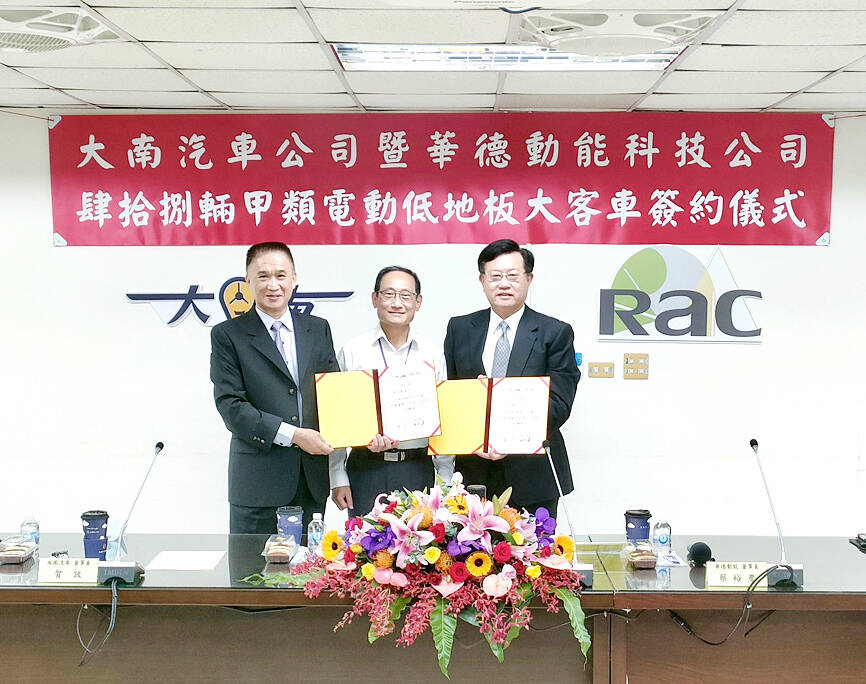RAC Electric Vehicles Inc (華德動能科技) has landed a NT$550 million (US$17.4 million) order from local bus operator Danan Bus Co (大南客運) to supply electric buses and deploy charging piles.
RAC has been contracted to deliver the first of the 48 electric buses to Danan Bus next year, the company said in a statement on Wednesday following a signing ceremony in Taipei.
The electric buses are expected to operate between the Taipei MRT’s Xinbeitou and Taipei City Hall stations, it said.

Photo courtesy of RAC Electric Vehicles Inc
RAC is to help install charging piles with a 120 kilowatt capacity, and build energy storage cabinets in the bus operator’s operation control center in Taipei’s Beitou District (北投), the statement said.
The charging piles and energy storage systems are to be designed and manufactured by RAC’s parent company, Mobiletron Co (車王電子), the statement said.
Maxine Technology Co (銓鼎科技), a subsidiary of RAC, is to help design vehicle fleet management software, a battery charging management system and an energy management system, it said.
RAC this year has signed orders to supply 64 electric buses to operators in Taiwan, it added.
RAC said it is confident that it would obtain subsidies from the Ministry of Transportation and Communications to build new electric buses.
The company in January received ministry subsidies of NT$10 million per vehicle to produce 105 electric buses.
The ministry has set a goal to electrify the nation’s buses entirely by 2030 through subsidizing electric buses.
RAC in June expanded its business in Japan to supply electric buses to Nishi-Nippon Railroad Co in Fukuoka City, the statement said.
RAC began using a new plant in Taichung this quarter to support growing customer demand locally and abroad, it said.

In Italy’s storied gold-making hubs, jewelers are reworking their designs to trim gold content as they race to blunt the effect of record prices and appeal to shoppers watching their budgets. Gold prices hit a record high on Thursday, surging near US$5,600 an ounce, more than double a year ago as geopolitical concerns and jitters over trade pushed investors toward the safe-haven asset. The rally is putting undue pressure on small artisans as they face mounting demands from customers, including international brands, to produce cheaper items, from signature pieces to wedding rings, according to interviews with four independent jewelers in Italy’s main

Macronix International Co (旺宏), the world’s biggest NOR flash memory supplier, yesterday said it would spend NT$22 billion (US$699.1 million) on capacity expansion this year to increase its production of mid-to-low-density memory chips as the world’s major memorychip suppliers are phasing out the market. The company said its planned capital expenditures are about 11 times higher than the NT$1.8 billion it spent on new facilities and equipment last year. A majority of this year’s outlay would be allocated to step up capacity of multi-level cell (MLC) NAND flash memory chips, which are used in embedded multimedia cards (eMMC), a managed

Japanese Prime Minister Sanae Takaichi has talked up the benefits of a weaker yen in a campaign speech, adopting a tone at odds with her finance ministry, which has refused to rule out any options to counter excessive foreign exchange volatility. Takaichi later softened her stance, saying she did not have a preference for the yen’s direction. “People say the weak yen is bad right now, but for export industries, it’s a major opportunity,” Takaichi said on Saturday at a rally for Liberal Democratic Party candidate Daishiro Yamagiwa in Kanagawa Prefecture ahead of a snap election on Sunday. “Whether it’s selling food or

In the wake of strong global demand for AI applications, Taiwan’s export-oriented economy accelerated with the composite index of economic indicators flashing the first “red” light in December for one year, indicating the economy is in booming mode, the National Development Council (NDC) said yesterday. Moreover, the index of leading indicators, which gauges the potential state of the economy over the next six months, also moved higher in December amid growing optimism over the outlook, the NDC said. In December, the index of economic indicators rose one point from a month earlier to 38, at the lower end of the “red” light.